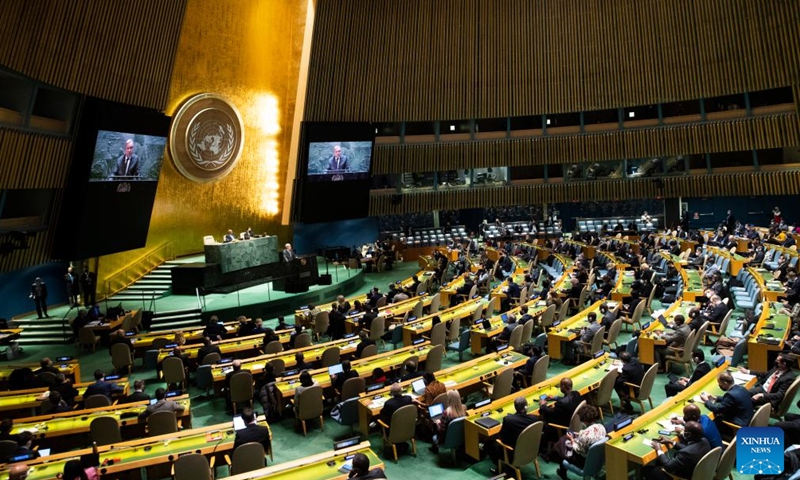
An emergency special session of the UN General Assembly on Ukraine is held at the UN headquarters in New York, Feb. 28, 2022. (Photo: Xinhua/Wang Ying)
The conflict between Russia and Ukraine is continuing, accompanied by changes in the global political situation. A war tests stakeholders' strength, stamina, endurance, will, judgment and the capability to create momentum and take advantage of it. China needs to accurately judge the development of the political situation, analyze its strategic position and make a correct and effective response.
The current situation is featured with the following key characteristics. First, Russia is bound to continue the military operation. Its firm will is premised on future gains. If the development is predictably favorable, then the cost of the war will be worthwhile for Russia.
Second, the US is incapable of controlling the situation. Since the outbreak of the crisis, the US has shown no greater resolution other than playing the political tricks, such as rallying allies against Russia. In the future, the rules underpinned by US power will tend to be less dominant. The stakeholders that are part of the small blocs that comprise the US and UK will have to reassess the political benefits of sustaining the old system.
Third, different sides make decisions based on their own benefit. The scenario of decentralized decision-making used to be abnormal, but is now becoming normal. The continuing conflict and unpredictable risks will further strengthen decentralized decision-making. Though the development of the situation in the future will decide how different stakeholders will act, it is clear that: The "West" will become purely a concept, and the world will embrace an important opportunity to construct new rules.
China is seen as the most influential political power. Different sides have varied expectations of China. French President Emmanuel Macron told reporters on Thursday after the NATO summit and G7 meeting that China, as a member of the United Nations Security Council and as a great power, should be "a power of mediation and moderation." In the critical moment of the crisis, China should proactively decide how and when to involve, and show its mature and highly effective capacity for action.
The conflict between Russia and Ukraine is fundamentally the result of the US and West's practice of using "winner takes all" tactics. Their manipulation of geopolitics and disruption of the balance in strategic space also contributed to the crisis. China needs to repeatedly tell the West that it must face up to and fix the unfair rules and distorted political ethics - the world needs more mutual respect.
All countries' attitudes and strategic choices will change along with the crisis. The Asia-Pacific region is the focus of the game between the East and the West. The stability in regional alliances is the reflection of US power and credibility. But the Ukraine crisis is changing the strategic environment in the Asia-Pacific, where all involved have to make strategic judgments accordingly. India didn't join the sanctions against Russia. Indonesia, as the host of the G20 summit this year, has repeatedly said that discussions about the Russia-Ukraine conflict would not suit the agenda. This will bring more uncertainties for China, as well as opportunities.
The Strategic Compass released by the EU on March 21 revealed the bloc's political intent to mediate without NATO - but the US and NATO will not allow it. The procedure of the UN Security Council has, for now, left it without any effective mechanism to bring about political reconciliation. China, with a possible role as a mediator, can join hands with Europe to act more constructively in promoting peace and talks.
New mechanisms of global collective and sustainable security are needed. Real multilateralism is built only on the basis of real power balance. A new system after the Russia-Ukraine conflict will be necessary, under which a country's move to protect another country's security must be approved by a collective decision in the first place.


